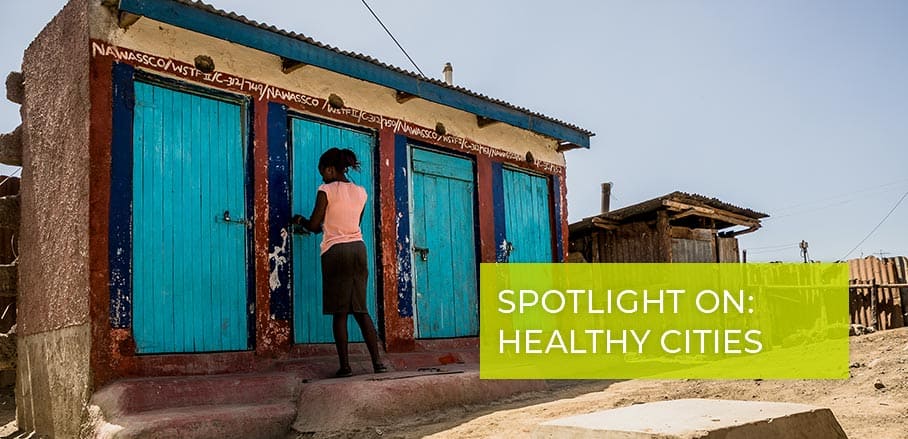Making Water and Sanitation Work for the Poor in Kenya
A well-functioning system for water and sanitation must address the needs of under-served urban residents. Eden Mati-Mwangi shows how a systems-change approach can have a lasting impact on Kenya’s sanitations sector.
The majority of the Kenyan urban population still lives in densely populated, unsewered areas. In fact, over 10 million urban residents live in slums or informal settlements with poor environmental conditions and limited access to adequate sanitation. As a result, many residents are at high risk of contracting excreta-related diseases.
In recent years, several attempts have been made to improve sanitation conditions in Kenya’s cities, including the creation of conventional sewer systems. However, the cost of these systems is much higher than many residents can afford, leaving the poorest vulnerable to using unregulated and often unsafe sanitation services.
There is also a severe lack of investment in sanitation: less than 0.5 per cent of Kenya’s GDP is earmarked for sanitation, which is only about two dollars per person per year. Limited public budgetary allocations and private-sector investments have deprioritised sanitation on the national agenda. In 2017, the WHO/UNICEF Joint Monitoring Program classified Kenya as having made ‘little to no progress’ in improving access to safe sanitation.
Policy Changes and Implications for the Sanitation Sector
How can Kenya address these challenges? For Water & Sanitation for the Urban Poor (WSUP), which focuses specifically on water, sanitation and hygiene solutions for under-served urban residents, this challenge is not solved through simply building toilets and improving sanitation waste management. We need to look more closely at the broader system in cities – the capacity of institutions, the policies, the regulation, and the available finance. Indeed, enhanced sector coordination, coupled with clearer policy mandates for implementing sustainable sanitation interventions, has already begun taking form in Kenya.
Currently, the government is in the process of transferring the mandate for sanitation from the Ministry of Health to the renamed Ministry of Water, Sanitation and Irrigation (MoWSI). MoWSI intends to enforce low-income residents’ right to a reasonable standard of sanitation, as established in the 2019 Kenyan Environment Health and Sanitation Bill. Already this year, the new Sanitation Directorate under MoWSI formed a new multi-stakeholder platform, calling for enhanced coordination and consultation to achieve tangible improvements in sanitation.
There is also ongoing high-level commitment by national government to set aside at least 0.5 per cent of GDP for sanitation in the coming year. This goes hand in hand with recent external development partnerships, private sector commitments, and new philanthropic funds focusing on the development of this sector as sanitation issues gain more prominence. These new funding partners provide opportunities to improve the long-term efficiency and inclusiveness of sanitation interventions in urban areas.
Taking a Systems-Change Approach
To create however a truly long-lasting and transformational impact, we need to take a systems-change approach to sanitation. This strategy aims to strengthen city-wide sanitation systems through targeted interventions at multiple levels of the sanitation market – including the base of the pyramid comprising the poor. Sanitation, particularly when based on affordable on-site sanitation or low-cost simplified sewers, tends to be a sector largely driven by supply pressures rather than consumer demand. The systems-change approach however first aims to understand what constraints the poorest face. It then addresses these constraints by working with a range of actors at all levels of the market system.
This is premised on the fact that it is policy makers, mandated government institutions and licensed service providers who can deliver the flexibility required to get the best out of a complex system: deciding on the way forward, reviewing the results and making the necessary course adjustments over many years.
For instance, WSUP works with institutions such as the African Ministers’ Council on Water at the pan-African level, the Water Services Regulatory Board at the national level, as well as connecting directly with communities at the consumer level. WSUP’s permanent presence in Kenya’s major cities – including Nairobi, Mombasa, Kisumu, and Nakuru – is key in allowing us to better effect change and properly gauge whether and how the system is improving.
Cross-Country Experiences
Indeed, the very process of developing regulatory frameworks for sanitation is pivotal to advancing systems change. Our experience in Zambia and Mozambique has shown that tangible improvements in sanitation service delivery are possible, even though regulatory instruments supporting these improvements are still to be fully implemented.
In Lusaka, Zambia, detailed work involving a wide range of stakeholders has led to the publication of a regulatory framework for urban sanitation. This has required commercial utilities throughout Zambia to pay closer attention to their sanitation services in urban areas and, most importantly, expand their services to low-income residents.
Similarly, in Maputo, Mozambique, plans for a sanitation tariff represent a significant sectoral development. Its planned introduction has already revealed to what extent mandates between the regulator and municipality overlap, necessitating both institutions to reflect on their respective roles in supporting sanitation service provision.
These examples demonstrate that initial and localised interventions of this type can highlight connections to other parts of the system which may not have been obvious – giving organisations the flexibility to act, monitor, and adapt in response to systems feedback.
Revolutionising Sanitation Services in Kenya
WSUP’s overriding goal is to strengthen Kenyan urban sanitation systems within the next five years, transforming the way sanitation services function. If we encourage market development across the sanitation system, it is possible to drive forward effective policies and regulation, enhance the capacity of the public and private sectors, and leverage investment. Implemented correctly and from the perspective of a systems-change approach, this will create a stronger sanitation system, revolutionising sanitation services for millions of poor urban residents.
- Making Water and Sanitation Work for the Poor in Kenya - 16. June 2020
